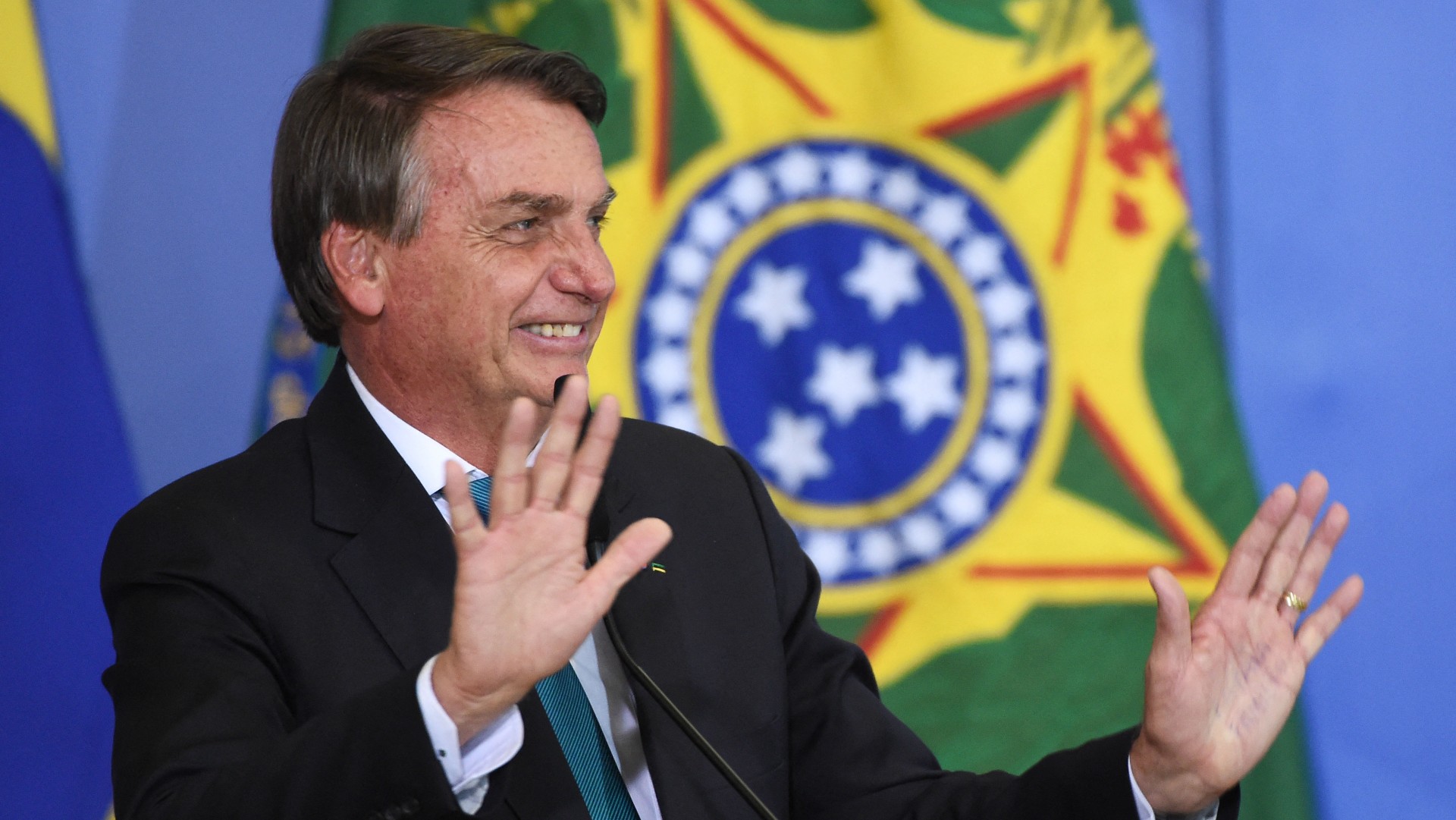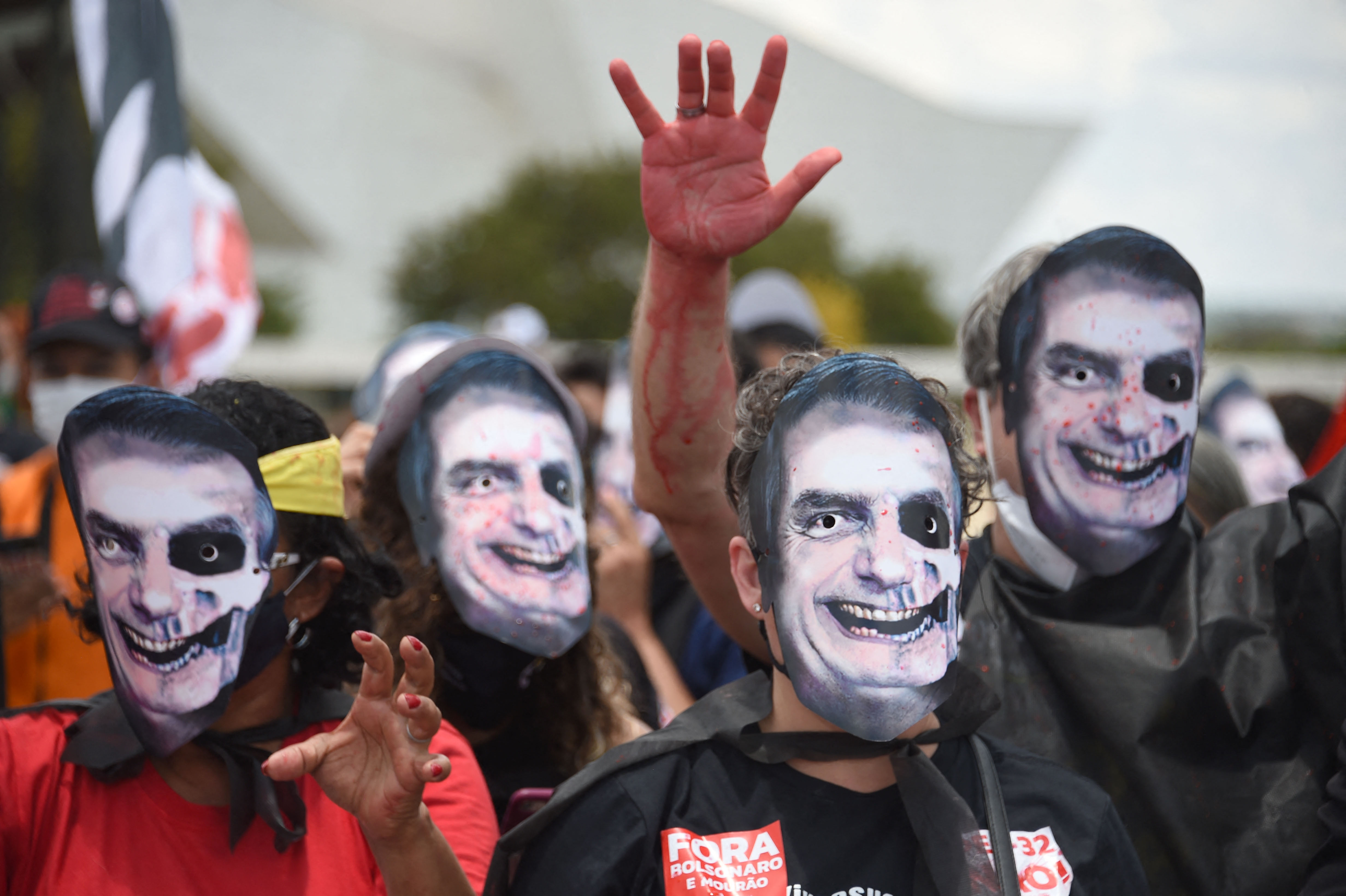Why Brazil’s Jair Bolsonaro may face criminal charges over Covid
Senators vote in favour of holding ‘serial killer’ president liable for world’s second-highest death toll

A free daily email with the biggest news stories of the day – and the best features from TheWeek.com
You are now subscribed
Your newsletter sign-up was successful
Brazil’s Senate is calling for the prosecution of President Jair Bolsonaro on charges including crimes against humanity over his handling of the Covid-19 pandemic.
Lawmakers have voted to approve a report by an opposition-controlled committee that recommended pursuing a total of nine criminal charges against Bolsonaro for a response that has left Brazil with the world’s second-highest coronavirus death toll.
A draft version of the 1,300-page-plus report had called for the president to be indicted for genocide and murder, but senators “decided to drop” those charges for “technical reasons”, said The Telegraph. But they “decided to add ten people to the list of individuals who should be indicted”, taking the total to 78, including Bolsonaro, along with two companies.
The Week
Escape your echo chamber. Get the facts behind the news, plus analysis from multiple perspectives.

Sign up for The Week's Free Newsletters
From our morning news briefing to a weekly Good News Newsletter, get the best of The Week delivered directly to your inbox.
From our morning news briefing to a weekly Good News Newsletter, get the best of The Week delivered directly to your inbox.
‘Death compulsion’
A “six-month investigation” found that Bolsonaro “deliberately exposed Brazilians” to what the Senate committee termed “mass infection”, as part of “a disastrous attempt to reach herd immunity”, The Times said.
“The nine recommended charges include prevarication, charlatanism, and incitement to crime linked to flouting expert advice on containing the virus,” the paper added. The report was passed to the full Senate, which on Tuesday voted seven to four in its favour.
According to John Hopkins University tracking, Brazil has so far reported 21.7m infections and more than 606,000 deaths. Only the US, which has recorded more than 735,000 deaths, has a higher total number of Covid-linked fatalities. Data from Statista shows that Brazil’s deaths per capita is far higher than the US.
A free daily email with the biggest news stories of the day – and the best features from TheWeek.com
Presenting the report at a press conference, lead author Senator Renan Calheiros said: “It is the responsibility mainly of this president, this serial killer, who has a death compulsion and continues to repeat everything he has done before.”
According to Sky News, Bolsonaro has repeatedly “sabotaged local leaders’ restrictions aimed at preventing the spread of the virus, arguing that the economy needed to keep going to ensure the poor did not suffer hardship”. When Covid first hit Brazil last year, he compared the virus to a “little flu”.

The president has also “cast doubt on vaccines”, resulting in a slow rollout across Brazil, and has recommended “an anti-malaria drug long after testing showed it is not effective against Covid-19”, the broadcaster added.
The newly published Senate report calls on Brazil’s Supreme Court to “suspend his access to YouTube, Twitter, Facebook and Instagram for falsely claiming that Covid vaccines were linked to Aids”, reported The Times.
The committee also recommended charges against people including “current or former Health Ministry employees, as well as the governor of hard-hit Amazonas state”, said The Guardian. Others facing potential charges include “administration officials, dozens of allies and the president’s three sons, who are politicians”, the paper added.
‘Too little, too late’
Presenting the report, centrist Senator Calheiros said “Bolsonaro’s government will enter history as the lowest level of human destitution”.
The president “strongly collaborated for Covid-19’s spread in Brazilian territory”, he added, and is “the main person responsible for the errors committed by the federal government during the pandemic”.
Loyalists have dismissed the report’s findings as political point-scoring ahead of Brazil’s general election next year. Senator Flavio Bolsonaro, one of the president’s sons, said: “The intent of some senators on the investigative committee is to cause the maximum amount of wear and tear on the president.”
The Brazilian leader was also defended by Donald Trump, who minutes after the report was published issued a statement saying that his “friend” Bolsonaro “fights hard for, and loves, the people of Brazil – just like I do for the people of the United States”.
The former US president added: “Brazil is lucky to have a man such as Jair Bolsonaro working for them. He is a great president and will never let the people of his great country down!”
According to The Times, Bolsonaro is “unlikely” to “face formal charges in Brazil because they would have to be brought by Augusto Aras, the prosecutor-general whom the president appointed”. So “any charge of crimes against humanity would have to be pursued by the International Criminal Court (ICC)”.
Brazil is a “party to the Rome Statute, which created the ICC, so the international court could take up the case”, the BBC explained. But that “would only be a first step in a lengthy process in which it would be up to the ICC to determine the merits of the case and whether to take it forward”.
Regardless of whether Bolsonaro is called to account for his actions in front of The Hague, “the report hurts Bolsonaro while he is recording his lowest-ever approval ratings”, The Times said.
Polls have him trailing the left-wing former president Luiz Inacio “Lula” da Silva, suggesting he could be “on track to lose office” when voters have their say in a year’s time, the paper added.
Yet “for many”, said the BBC’s South America correspondent Katy Watson, the findings of the report are “too little, too late”.
“The families of the dead will be wanting to know where this inquiry will lead,” she wrote. But hopes are low that Bolsonaro will be forced to “stand up in court to defend his actions” or that “justice will be done”.
-
 The environmental cost of GLP-1s
The environmental cost of GLP-1sThe explainer Producing the drugs is a dirty process
-
 Greenland’s capital becomes ground zero for the country’s diplomatic straits
Greenland’s capital becomes ground zero for the country’s diplomatic straitsIN THE SPOTLIGHT A flurry of new consular activity in Nuuk shows how important Greenland has become to Europeans’ anxiety about American imperialism
-
 ‘This is something that happens all too often’
‘This is something that happens all too often’Instant Opinion Opinion, comment and editorials of the day
-
 Epstein files topple law CEO, roil UK government
Epstein files topple law CEO, roil UK governmentSpeed Read Peter Mandelson, Britain’s former ambassador to the US, is caught up in the scandal
-
 Iran and US prepare to meet after skirmishes
Iran and US prepare to meet after skirmishesSpeed Read The incident comes amid heightened tensions in the Middle East
-
 Israel retrieves final hostage’s body from Gaza
Israel retrieves final hostage’s body from GazaSpeed Read The 24-year-old police officer was killed during the initial Hamas attack
-
 China’s Xi targets top general in growing purge
China’s Xi targets top general in growing purgeSpeed Read Zhang Youxia is being investigated over ‘grave violations’ of the law
-
 Panama and Canada are negotiating over a crucial copper mine
Panama and Canada are negotiating over a crucial copper mineIn the Spotlight Panama is set to make a final decision on the mine this summer
-
 Why Greenland’s natural resources are nearly impossible to mine
Why Greenland’s natural resources are nearly impossible to mineThe Explainer The country’s natural landscape makes the task extremely difficult
-
 Iran cuts internet as protests escalate
Iran cuts internet as protests escalateSpeed Reada Government buildings across the country have been set on fire
-
 US nabs ‘shadow’ tanker claimed by Russia
US nabs ‘shadow’ tanker claimed by RussiaSpeed Read The ship was one of two vessels seized by the US military